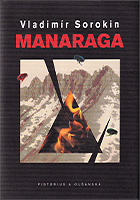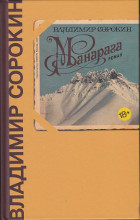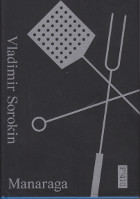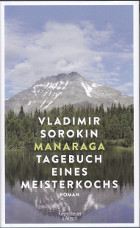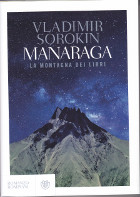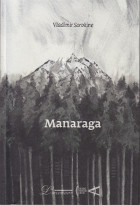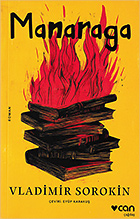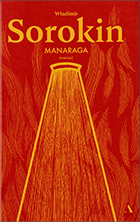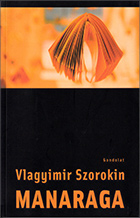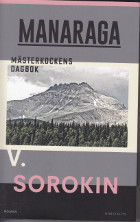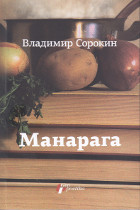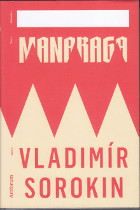Vladimir Sorokin
Manaraga
Proposal
Published by
- Corpus, Moscow
- Rights acquired by
- Gondolat Kiadó, Hungary
- Pistorius & Olsanska, Czech Republic
- Artforum, Slovakia
- Kiepenheuer & Witsch, Germany
- Norstedts, Sweden
- Bompiani, Italy
- Genesis Culture Corporation, China
- Agora, Poland
- Geopoetika, Serbia
- Flamme, Norway
- Les Éditions l’Inventaire, France
- Locus, Israel
- Artkonekt, North Macedonia
- Can Publishing, Turkey
“Probably his best book since Blue Lard” (Galina Yuzefovich).
Sorokin, in his latest novel, catapults the reader into the period following the Second Islamic Revolution, and the subsequent wars, marking the end of the Migration Period. It is a time when a new business, book-’n-grill, flourishes. Reading books has been long dead and buried, with the surviving copies turning into museum artifacts and collectables. Guttenberg’s press remains committed to printing exclusively banknotes.
“The first steak was grilled twenty years ago in London, over the blazing flames of the first edition of Finnegans Wake stolen from the British Museum. It was cooked and eaten by four great men: a shrink, a florist, a stockbroker, and a contrabassoon player, celebrating the birth of a great infatuation—people have always been suckers for forbidden fruit.
Burglars started to put their hands to work at book depositories, and connoisseurs and the Bright Young Things at the first underground reading rooms. Then middlebrows followed suit en masse. Back in those crazy, weird years, people, absorbed in the grilling process itself, cared little about quality. Rich dunces, metamorphosing into connoisseurs overnight, devoured dry-aged John Dory steak grilled over “The Old Man and the Sea”, arrachera hanger steak scorched over the dry heat fed by the burning works of Dos Passos, and undercooked pork over “Schweik”.
Six months later, however, when the news of looted museums and libraries across the globe lost its appeal, humankind was forced to ban book-‘n-grill as a crime not only against culture, but civilization as well. The long arm of the law, like the sword of Damocles, hung over not only cooks, book thieves, and their clients, but also the patrons looking to partake of rack of lamb roasted over “Don Quixote” or tuna steak using “Moby-Dick” for firewood. The first trials proved quite controversial, naturally resulting in severe sentences. And this is how the book wound up in the Red Book of Endangered Species. Consequently, book-‘n-grill prices skyrocketed. Dilettantes were sifted and left out. Reading became the exclusive purview of professionals, and then the Kitchen materialized, with its traditions, rituals, hierarchy, finances, and security agency.
To stave off conflict, the Kitchen distributed spheres of influence, giving rise to experts in Spanish, French, Norwegian… literature. One is roasting meat over a Fleming anthology for the family of an American billionaire fixated on James Bond. Someone else is cooking “The Magic Mountain”-fueled veal lungs with wieners grilled over “Man of Straw” for a German Nouveau riche. Wiener Schnitzels over Schnitzler target the Austrian aristocrats. Bandits, on the other hand, are not as patriotic—they prize “firewood” with thrilling plots, such as “The Godfather”, “The Judge and the Executioner”, “Ten Little Niggers”, “Rosemary’s Baby”, “Death under Sail”, and other chillers. Abram reads exclusively in Yiddish—his vorschmack appetizer and chicken liver prepared over the blazing works of Sholem Aleichem are simply fabled. He accompanies each reading with specific chanting incorporating quotes and lamentations, leaping about rhythmically all the while.
The fate of the novel’s protagonist, one of the Kitchen’s book’n-grill chefs called Geza, is dotted with twists and turns, just like the history of the past few decades. He was born in American-occupied Budapest, to a Belorussian Jew father and a Polish Tatar mother. His father fled to Budapest from Orthodox Christian Fundamentalists, and his mother from Islamists. “Both groups of those bearded obscurantists sought to win the population’s heart and respect, therefore they bombed, burned, slaughtered, and gunned down mercilessly.” From a peaceful Budapest, however, they were forced to find refuge in Bavaria, after the Americans withdrew from Hungary following the infamous Transylvania Truce and, subsequently, a new wave of the Second Islamic Revolution flooding Eastern Europe.
Geza went the whole nine yards, from an ordinary diner cook in Hong Kong to a catering chef on call with three stars, whose success was complemented by envelopes tightly packed with banknotes. He was a virtuoso when it came to turning burning pages with a metal strip in the form of a sword, the Excalibur in professional jargon.
“Airports, hotels, railroad stations, and car rentals, they are very important to us. These, of course, are not ancestral homes, but at least they are homey… I have not had a permanent place of abode in over eight years, only a bunch of suitcases with clothing and equipment wandering with me around the world. And this pretty much sums up the life of any book’n-grill chef. Six passports to different names, and my fingers, unlike the proverbial leopard’s stripes, can easily strip away and reapply fingerprints—no pun intended. And thanks to this way of life, I am still free. It’s a miracle, all right, but it can’t last forever. That’s why I pay top dollar for cutting-edge technology, psychics, astrologists, amulets, monastic prayers, bribing officials from the anti- book-‘n-grill department… Better safe than sorry. After those two bullets, three search and seizure procedures, two shootouts, three boodles of queer, four fistfights… My smart fleas are my helpers. I have three: red, blue, and green. The red one runs the show, being in charge of my psychosomatics + keeps me on top of things + makes me smarter—an expensive toy, version 7, worth 100,000 in new banknotes, dove into the pons Varolii of my brainstem six months ago. The blue one, navigational, hangs around in my hair. The green one, running my information and communications department, resides in my auricle.
That I’m still all oak and iron bound I credit to my fleas. Besides, now I have EVERYTHING in my head. With some flea assistance, I can deliver a lecture on the latest dark field theory, elaborate on all known apocryphal gospels, refute the Schrödinger uncertainty equation using the Kameyama formula, or give a comprehensive answer to the question of the manufacturing technology for smart dough or these fleas of mine.
The slightest blunder, incertitude, or overconfidence inevitably leads to disaster. My profession goes hand in hand with risk. At best, it means loss of money, a glass of wine thrown in my face, luxury tableware crashing on my head. At worst, a soft, though sometimes even hard, bullet. Nowadays, ex-cons are ordering more and more antiquarian booksellers’ feasts, and Europe, since the end of the war, has been drowning in weapons at that.”
Geza’s true success came with the classics of Russian literature.
“To me, books are not just firewood, as they are known in our underground culinary community. All in all, a book is a whole world, albeit gone forever. In this sense, I’m a romantic. I am a son of a humanity scholar, grandson of a dentist, great-grandson of an attorney, and great-great-grandson of a rabbi. And I’m sure about one thing: If you really love a book, it gives you all its warmth. I love Russian classics, though I haven’t read a single Russian novel even halfway. And I refuse to grill a steak over a second-rate author like Gorky, for example.”
With his case for the chef’s whites and the Excalibur, Geza flies from country to country, unveiling the backstage of this imaginary “brave world” for the reader. Sorokin cracks up the reader with his descriptions of Geza’s clients. In Paris, Geza cooks candied magnolia stems over the flames from Ageyev’s “Cocaine Romance” for a Grand Opera diva. In Berlin, he grills cubed sturgeon on skewers over Dostoyevsky’s flaming “Idiot”, while the ecstatic host asks his wife, “Suzanna, can you smell the 100,000 tossed by Nastasya Filippovna into the fire?” In Norway, he is busy roasting herring over “The Steppe” by Chekhov. In Switzerland, the only country to have survived global disasters, an enormous zoomorphic creature with the face of a fox, who fancies itself a new Nietzsche, extracts a piece from its chest and begs to have it roasted over a burning manuscript. In blood are inscribed his appeals to the lost man who has rejected everything animal and, therefore, failed to become Overman. In the vast open ocean, Geza reads Babel’s “The Odessa Tales” for a patriarchal Hebrew family, which seems to be created by the genius of Kusturica. Their three-decker catamaran has been sailing in international waters for two years. In Japan, he cooks for an old man who, even though no longer able to eat, looks greedily at three young men gobbling delicacies they have ordered. Next is a reading up North, for an unusual client who introduces himself as Tolstoy, his wife Sophia Andreyevna and daughter Tatyana—a spitting image of the family of the major Russian classics author. With enough money, however, you can shape yourself into whomever you please. The client wants carrot cutlets braised over the manuscript of his own story called “Tolstoy”. The cutlets are served with sauerkraut, horseradish, rye bread, and water on the side.
“3333,” signals the security flea. The Kitchen Quintet is summoning all cooks. This means that something out of the ordinary has happened. At first, there was a war with Latino cooks trying to inundate Europe with tons of cheap arrachera hanger steaks grilled over Dos Passos and caimans over Borges. Then the Germans made a boo-boo. They decided to do a number on the other European cooks by spreading rumors about Goering’s so-called ancient library as though discovered in the Alpine quarries. Clients with deep pockets from all over the world flocked to the basements of Berlin, Munich, and Cologne. The Germans transformed into ancient Greeks in the blink of an eye, their prices going over the top, crashing the rest of the market. An emergency convention followed, issuing an ultimatum to the Germans. Admittedly, as reasonable people, they backed down, burning half of the bogus stuff, dropping prices, and started to share. Still, it took a couple of stiffs—in our line of work, it comes with the territory, right?”
Emergency convention in Bavaria. The Kitchen Quintet brings to attention a fake, Nabokov’s novel “Ada”. “All books are absolutely identical. The tear in the dust jacket, scuff marks, tea stains, scratches, folded edges of pages, two holes, and pencil notes on page 142—perfect match! This is a molecular product, an exact copy of one copy from the English-language batch of ‘Ada’ printed in 1969 by McGraw-Hill, using a device previously favored only by counterfeiters and antiquarian jewelers. There you have it! Nabokov’s apple of discord, ‘Ada’ written in English by a Russian author in a French-speaking canton of Switzerland. It is read by Americans, English, Russians, and even Swiss. I am convinced that, in due time, the French will also join in. Greetings from Montreux, everyone! No exclusive reading rights apply! This is exactly why the molecular hustlers picked ‘Ada’. A flawlessly calculated strike against the Kitchen… A perfect product to roll out—‘Ada’ is pitch-soaked wooden log that makes cooking a sheer bliss, with thick wood pulp paper making up 626 pages, cloth-case binding, and a coated paper dust jacket. Burns like Rhodes pine. ‘Ada’ can be used to cook any combination of seafood for a dozen of people, also lamb cutlets, quail, succulent ribeye steaks, and even venison saddle. Great book!”
The Kitchen is on the verge of bankruptcy. The molecular device can print any number of copies.
It has been decided to destroy the machine and the whole batch. Lots are cast, and Geza draws the burned matchstick. He must fly in the company of security services over to the former Republic of Ural, which has turned into a dangerous enclave run by four gangs. There, in the bosom of Mount Manaraga—Bear Paw in the Nenets language, the flea reminds him— molecular “originals” of archaic copies of great classics are secretly manufactured.
. . .
The reader follows the protagonist into Mount Managara, an even braver new world promising the Kitchen a bright future, with formally legalized restaurants using classics like “Ada”, “Don Quixote”, “Ulysses”, “The Trial”, and other masterpieces to prepare all kinds of dishes. No more turning pages, no more fear of a bullet or trial—it is legal now! Yet an even greater tomorrow will dawn for the Kitchen when cooks in official restaurant networks all over the world will start cooking over ancient manuscripts, such as the sacred Zoroastrian “Avesta” texts, the Bible, and so forth. All it will take is replacing Geza’s fleas, so that he may perceive this new tomorrow as if it were streams of sunlight brimming with joy.
This is by far the wittiest text written by Russian classic Vladimir Sorokin. He, like an equilibrist, skillfully toss-juggles the exciting plot and predictions about the future—and this is where he is at his best, unrivaled, as evidenced, for one, by his “Day of the Oprichnik” as though adopted by Putin’s Administration as its action plan—offering an amazingly succinct analysis of classics and contemporary literature. For the uninitiated, Sorokin writes fantasy with elements of a thriller. For true literary aficionados and connoisseurs, he has cooked a fantastic dish featuring a blitz-parody of Tolstoy, post-Soviet patriotic literature—an author with a shaven head and an alcohol-affected look in his eyes, easily recognized as Zahar Prilepin—excerpts from “second-rate literature” and examples of Geza’s contemporary “flash literature”.
This “brave new world” is ridiculous. Geza’s dream of a lifetime involves a servant, meticulous and precise like a Swiss watch, always clean-shaved, cooking steaks, salads, and cold soups. Facial and penis rejuvenation, along with new fleas, by the age of 40… But is he not a mirror image of our times?
Behind these circus props, burning pages of classics of world literature, Sorokin, true to himself, offers dead serious in-depth thoughts about a possible future of not only literature but also the whole planet engulfed in the flames of mass consumption euphoria.
“The book is burning itself down, punchline by punchline, a furious, utterly entertaining little ‘pyro-magic’. As in Telluria we get to know in this light, ‘jocular’ genre the blueprint, the reality of a sinster new world which to fear we just again have some reason.” (Andreas Tretner)
From Russian reviews:
“Undoubtedly, Manaraga is a work of top value and relevance. Sorokin, with freedom unimaginable in modern Russian literature, openly discusses what awaits us and our literature-centric domain in the whole wide world” (Andrei Arkhangelsky).
“A few introductory lines and I already know it is Sorokin. He never changes and yet he constantly pushes the edge of the envelope… The very first lines establish the subliminal air of madness around the corner and keep you on the edge of the seat in anticipation of satire, grotesque, sarcasm, and irony. At the same time, there is nothing cheesy about it—just skillfully performed tricks of the trade; no artsy-craftsy stylization, but the true magic of hyperreality, authentic daydream fantasies naturally imbuing real life.” (livelib.ru).
“Sorokin hypothesizes about the future. Substances and technology, a peculiar mix of divine and mechanical, make the world go round. Many claim that events are discerned better in hindsight. Sorokin, however, does the opposite; he portrays the present as seen through the prism of the future” (livelib.ru).
